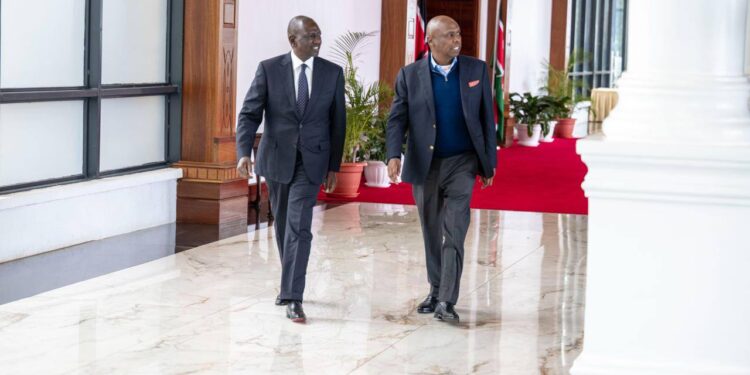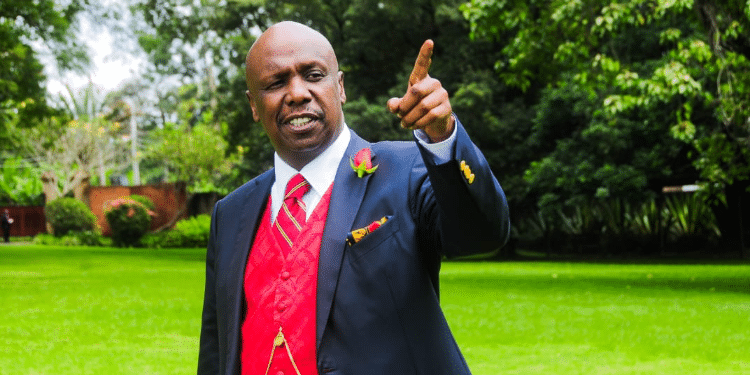
Emotional: Various ODM leaders at the home of slain Kasipul MP Charles Ong’ondo Were at Kasipul to comfort his family. Photo/Gladys Wanga/X
By Wanderi Kamau
The gruesome murder of Kasipul Member of Parliament Charles Ong’ondo Were has jolted Kenya’s fragile political handshake, putting the newly forged alliance between President William Ruto and ODM leader Raila Odinga under its most serious test yet.
The killing has ignited political tempers across the ODM stronghold of Nyanza, exposing the deep undercurrents of mistrust that continue to linger beneath the surface of the Ruto-Raila pact.
On Saturday, May 3, 2025, ODM leaders led by party chairperson and Homa Bay Governor Gladys Wanga openly lashed out at the Kenya Kwanza administration, demanding immediate answers and justice for the slain MP.
Speaking at a highly charged political gathering at the late MP’s home in Kasipul, Wanga did not mince her words, suggesting that Were’s murder could be politically motivated and warning that ODM would not allow the killing of its leaders to be normalized.
“Times that we cannot count, Were reported that his life was in danger. I know, he even wrote to the Inspector General of Police. I want the Police IG to tell us; when Were reported all these issues, what did he do about it?” an emotional Wanga posed.
“The way Were was killed—it is like a chicken! He was humiliated, like a thief, and he never stole anybody’s thing!” she added. “We have said we are working together…but we did not sign up for assassination of our members.”
The fury coming from ODM’s top ranks is emblematic of a broader sense of betrayal felt by the Luo political base. ODM leaders, long the custodians of the region’s political loyalty, now face the uncomfortable reality that their alliance with Ruto’s United Democratic Alliance (UDA) may be viewed by supporters as a pact built on sand.
ODM’s patience wears thin
Political analyst Gitile Naituli says the situation is delicate and could unravel the Ruto-Raila détente if not handled with transparency and urgency.
“This is not just about the murder of one MP. It goes to the core of political trust and security. The Luo community, which largely backs ODM, may begin to feel that their leaders are being targeted or left vulnerable under this regime,” says Prof Naituli. “If justice is not served swiftly and visibly, it could be interpreted as political betrayal.”

Wanga’s warnings were not empty rhetoric. She emphasized that ODM remains the dominant force in Nyanza and would not tolerate being sidelined or intimidated.
“This Homa Bay County and this entire region is an ODM zone!” she declared. “The next time I see what I saw at the funeral of [Preskila] Koyo, where my party leader Raila is seated and some people have come there shouting ‘UDA,’ we will not accept. Not under my watch.”
A calculated political signal?
National Assembly Minority Leader Junet Mohamed echoed the anger, linking Were’s killing directly to political machinations.
“We demand to know who killed Ong’ondo Were and the motive for his killing,” said Junet. “This is an elected leader killed like a chicken by the roadside! We know this is politics. But we want to know who did it and why.”
Read more:MP Charles Were’s murder: The unanswered questions

The remarks appear to be more than spontaneous outrage; to seasoned political observers, they bear the hallmarks of calculated messaging. Dr Rose Mwikali, a political commentator, believes that Raila Odinga often communicates through his lieutenants—and the current outcry might be his way of sending a message to President Ruto.
“Raila rarely speaks directly in moments of political turbulence. Instead, his closest allies voice the party’s deeper frustrations,” says DrLukalo. “What we are seeing now is not just ODM reacting emotionally—it’s a strategic warning shot.”
IG Kanja under pressure
That warning is being heard loud and clear across the political spectrum. Homa Bay Town MP Peter Kaluma and Senator Moses Kajwang’ reinforced the view that the party’s future cooperation with the government now hinges on the resolution of Were’s murder.
“We want answers on the murder of Honourable Charles Ong’ondo Were, whether our relationship with the current government is continuing or not,” Kaluma stated.
Analysts note that this murder has exposed not just the vulnerability of ODM MPs, but also the fragility of the Ruto-Raila working relationship, which has been marked by cautious optimism since their unexpected truce.
Read more:Inside the chilling murder plot against MP Ong’ondo Were
Martin Andati, another political analyst, suggests that Were’s death could be the straw that breaks the camel’s back. “There are already murmurs that the Luo community is not reaping enough from this regime. With Were’s death, those murmurs could turn into open rebellion,” Andati says. “The stakes are high because ODM leaders now have to prove to their supporters that the alliance is not costing them their dignity or security.”

The Inspector General of Police, Douglas Kanja, has also found himself in the crosshairs. With multiple ODM leaders alleging that Were had reported threats to his life without any police protection being provided, Kanja’s credibility and job security are increasingly under question.
“Were’s death is a political indictment of the police leadership. If he indeed reported threats and nothing was done, then it reflects either negligence or complicity. Either way, Kanja’s days could be numbered,” says Naituli.
According to political analysts, the pressure is mounting on both Ruto and Raila.
For Ruto, the test lies in demonstrating that the security of all citizens, regardless of political affiliation, is paramount. For Raila, it is about protecting his political turf and ensuring his handshake with Ruto does not translate into the erosion of ODM’s legitimacy.
In the days ahead, how both leaders respond could determine whether their fragile truce survives—or collapses under the weight of suspicion, mistrust, and political bloodshed.




1 thought on “Why Were’s murder is the biggest test to Ruto-Raila pact”
Comments are closed.